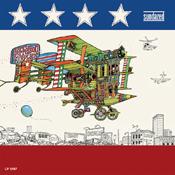The Airplane's Self-Indulgent Studio Extravaganza Improves With Age
Considered a sprawling, self-indulgent mess when first released in 1967 (RCA LOP-1511 mono/LSO-1511 stereo), and a warning to other bands and to record executives footing the bills for unlimited studio time (even the extra dollar added to the list price couldn't have paid for the studio time), After Bathing At Baxter’s has worn remarkably well, and in retrospect is a powerful, smoldering document reflecting a chaotic, violent and dangerous time in America—the kind of time we’d be having now if people would fucking wake up and smell the fascism.
The riff-based tunes on this album sound as if they weren’t so much written as they were pulled from the studio ooze and assembled. Yet once the band had settled on a tune, it delivered the goods with a drama and bravado missing in so much of today’s slacker “post music” music—not that there’s anything wrong with that.
A series of between-the-songs links filled with silly band banter (“no man is an island!...he’s a peninsula!) added to the sensation of self-indulgence, but the performances themselves are anything but, anchored by Jack Casady’s brutal bass lines. You need to hear his performance on a full range system to appreciate its nimble devastation.
Everyone steps up the plate here, with Jorma Kaukonen delivering, stinging, barbed wire guitar fills above Spencer Dryden's subtle cymbal swirls and machine gun drum fills. Those who expected “White Rabbit” or “Somebody To Love” pop performances from Grace Slick and beautiful Balin balladry may have been disappointed by how the duo laid back and slithered around the lyrical and melodic lines, but screw the folk music backdrops, these are fully charged, rock, sometimes jazz-tinged performances by a band that had integrated the vocals and instrumentals into a hard charging, complex whole.
1967 wasn’t a time for acoustic folk ballads. The band had put away the banjos and flutes and songs about funny cars. If you’re too young to remember, listen to the chaos reflected in the music and lyrics to “Wild Tyme”: “It’s a wild time, I see people all around me changing faces. I’m doing things that haven’t got a name yet. I see changes, changes, all around me are changes!” Even today, almost 40 years later, these lines deliver chills and produce acid-flashback visuals.
Side two’s long “How Suite It Is,” probably confounded and pissed off the Surrealistic Pillow demographic even more than side one’s organized chaos, but listening today, Kaukonen’s long, cinematic Coltrane-derived instrumental lines within “Schizoforest Love Suite” deliver a dramatic jolt, backed by the Dryden/Casady rhythm team’s damaging assault.
The vaguely Arabic “Two Heads” is the album’s dismissive, disgusted climax, with “Won'tYou Try/Saturday Afternoon” providing the sunset denouement. Listen carefully and you can easily imagine Crosby, Stills and Nash studying this album (separately of course) for clues to their musical future.
After Dave Hassinger’s pristine Surrealistic Pillow recording, this album’s dark, murky grunge, almost completely absent high frequencies, air or shimmer, came as a huge disappointment to sound enthusiasts but in retrospect, its AM radio tonality was so right, even if totally accidental. Get over the darkness and celebrate the depths!
As with Surrealistic Pillow it’s the rare “deep groove” mono mix that cuts sharpest. I’ve treasured my promo copy ever since I found it and it’s that one, not the stereo edition I’ve always gone to when I wanted to re-live the album and that tumultuous time. Brings back memories of an Airplane concert at Ithaca College I attended back then that almost caused a cafeteria riot, and did break a few glass doors as I remember it.
Sundazed’s mono reissue is almost too good to be true, but here it is, in all its huge, bass-rich one channel glory! Not quite as open and transparent on top as the original, but how much of that was there? Not much. More importantly, the reissue captures all of the weight and guts on bottom.
Imagine Sam Alito’s, John Roberts’s and George Bush’s faces back then hearing Grace Slick exclaim “ I’d rather have my country die for me!” Fuck ‘em if they can’t take a joke!




